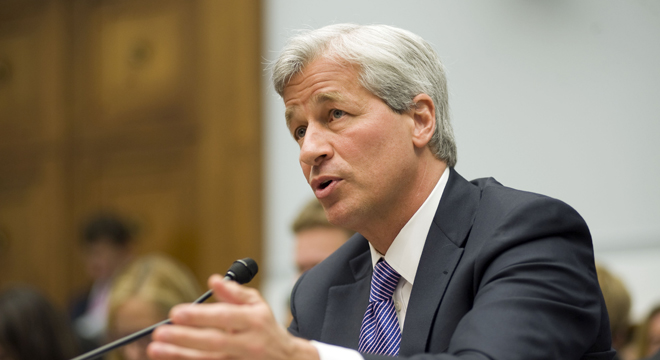JPMorgan CEO Jamie Dimon’s return to Capitol Hill Tuesday — this time before the House Financial Services Committee — wasn’t nearly as friendly as his visit to the Senate last week.
Defined by a greater sense of populism, and less dependent on big dollar donors for re-election, the House members were by and large much less solicitous of the famed financial executive. Frequently, they left Dimon on the defensive. More frequently their persistent questions — about the propriety of his service on the New York Federal Reserve board, his compensation, and the size of his firm — left Dimon visibly angry or annoyed.
The comparatively aggressive tone of the interrogation provided observers a civics lesson in the differences between the the upper and lower chambers.
The proceedings began with a request from Massachusetts Dem Stephen Lynch that Dimon be placed under oath. Chair Spencer Bachus (R-AL) declined, defended Dimon for agreeing to testify voluntarily, and cited the committee’s precedent of not swearing in witnesses.
A handful of members, mostly Republican, handled Dimon gently. But most did not. Ranking member Barney Frank (D-MA) set the tone in early questions, chastising Dimon for dodging and filibustering questions about the need for greater prudential regulation, and whether his compensation will be cut as a result of the company’s recent, controversial trading losses.
Rep. Michael Fitzpatrick (R-PA) pressed Dimon on his appointment to the New York Federal Reserve Board.
“So, the Federal Reserve rules are written by you all,” Dimon responded. “I should tell you that I don’t vote for the president, I don’t get involved in supervisory, I can’t serve in the audit committee. The board basically sits around and talks about the economy…it’s more of an informational advisory group and whatever the lawmakers write would be fine with me.”
Before challenging Dimon on the wisdom and economic benefit of financial shops hedging their investments, Rep. Gary Ackerman (D-NY) quizzed Dimon on the differences between gambling and the current investment environment on Wall Street.
“I used to think that all of Wall Street was on the level, that it facilitated investing, that it allowed people and institutions to put their money into something that they believed in and believed would be helpful and beneficial and grow and make money and especially help the economy and on the side create a lot of jobs and be good for our country and good for America,” Ackerman said. “Now a lot of what we’re doing with this hedging — and you can call it protecting your investment or whatever, but it is basically gambling — you’re just betting that you might have been wrong. It doesn’t help anything succeed anymore, doesn’t encourage anything anymore. It creates the possibility that people say, ‘do these guys really know what they’re doing if they’re now betting against their initial bet and if you go and hedge against your hedge — which means you’re betting against your bet against your first bet — it seems to me you’re throwing darts at a dart board and putting a lot of money at risk just in case you were wrong the first time. I don’t see how that creates one job in America.”
“You already said something that is false that we all know is false,” Rep. Brad Sherman (D-CA) insisted. Earlier Dimon had claimed that his firm’s overseas investments were necessary because there weren’t enough investment opportunities in credit-worthy domestic businesses.
“You put forward the idea that there were $350 million that you had given to your chief investment office because there weren’t small and medium-sized businesses in the United States that were credit worthy that wanted the money, and I assure you there isn’t a member of this panel that couldn’t bring you 100 small and medium-sized businesses, credit worthy, in need of loans from you, and instead you took the $350 million to London. That’s why we’re here, because if you made the small and medium-sized business loans, you wouldn’t be here.”
Dimon continued to resist calls for greater restrictions on the trading practices of commercial banks. And the hearing didn’t produce the sort of revelation that’s likely to force regulators to strengthen the famed Volcker Rule. But to a much greater extent than the Senate Banking Committee, it surfaced broad public unhappiness with big financial institutions and the culture that still prevails on Wall Street.
Dimon couldn’t dismiss it altogether.
“I think there might be a problem with some people on Wall Street,” he said.
Â
Â
Â
Â






